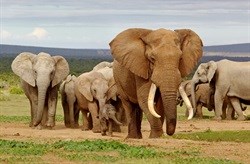Another two tons of ivory has been seized in Uganda, bringing to six tons the amount of ivory confiscated and linked to the east African country in just over a week. According to reports the ivory was intercepted by Uganda officials en route to Mombasa in Kenya, a main departure port for illegal ivory bound for Asia.

© David_Steele - Fotolia.com
The bust occurs after Kenya authorities last week said they had intercepted two consignments of two tons of ivory each in the previous seven days at Mombasa Port. Both were packed into containers sent from Uganda. "This year is proving to be a bloody one for elephants. If we are to save elephants we need to address every link in the ivory chain. That means stopping the killing, stopping the trafficking and stopping the demand," said James Isiche, International Fund for Animal Welfare (IFAW) regional director for East Africa.
"In 2011, it was thought that between 25,000 and 50,000 elephants lost their lives to poachers, and all for their ivory which is used to make trinkets that no one needs. Wildlife crime ranks among the most serious, dangerous and damaging of international crimes along with human trafficking, drug running and illegal arms sales."
Demand was boosted
Most illegal ivory is destined for Asia, in particular China, where it has soared in value as an investment vehicle and is coveted as 'white gold'. Limited availability of legal ivory in China purchased from the stockpile sale in southern Africa in 2008 has, in turn, boosted demand encouraging illegal ivory trade and the poaching of elephant to meet market needs. As part of a worldwide capacity building initiative IFAW trains law enforcement officers in wildlife trafficking prevention in several countries throughout Africa, the Middle East, Asia, Oceania, and the Caribbean.
The organisation recently signed a Memorandum of Understanding with Interpol, the first ever signed by Interpol's Environmental Crime Programme with an NGO. IFAW and Interpol have collaborated on numerous projects since 2005 including Interpol's largest-ever illegal ivory trade operation in 2012.






























